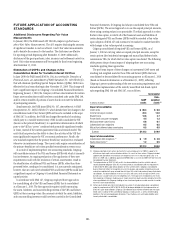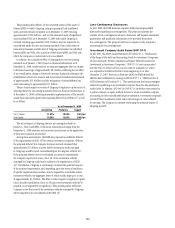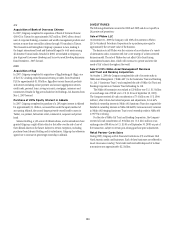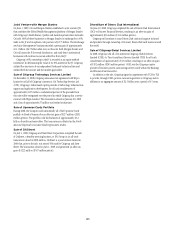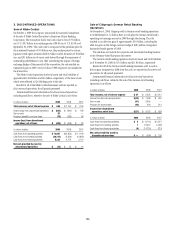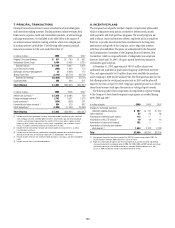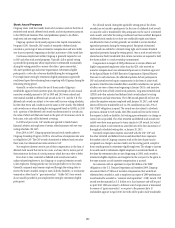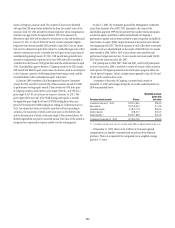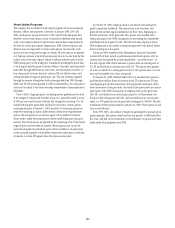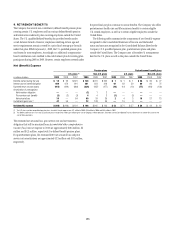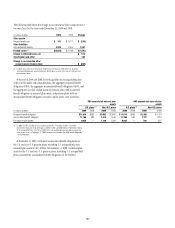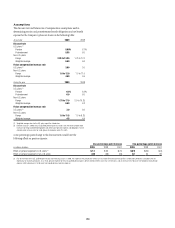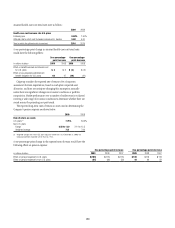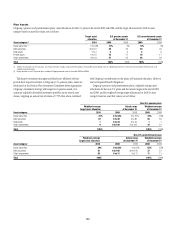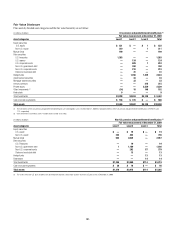Citibank 2009 Annual Report Download - page 161
Download and view the complete annual report
Please find page 161 of the 2009 Citibank annual report below. You can navigate through the pages in the report by either clicking on the pages listed below, or by using the keyword search tool below to find specific information within the annual report.151
Stock Award Programs
Citigroup issues (and has issued) shares of its common stock in the form of
restricted stock awards, deferred stock awards, and stock payments pursuant
to the 2009 Stock Incentive Plan (and predecessor plans) to its officers,
employees and non-employee directors.
Citigroup’s primary stock award program is the Capital Accumulation
Program (CAP). Generally, CAP awards of restricted or deferred stock
constitute a percentage of annual incentive compensation and vest ratably
over four-year periods, beginning on the first anniversary of the award date.
Continuous employment within Citigroup is generally required to vest
in CAP and other stock award programs. Typically, full or partial vesting
is provided for participants whose employment is terminated involuntarily
during the vesting period for a reason other than “gross misconduct,”
who meet specified age and service requirements (retirement-eligible
participants), or who die or become disabled during the vesting period.
Post-employment vesting by retirement-eligible participants is generally
conditioned upon their refraining from competing with Citigroup during the
remaining vesting period.
Generally, in order to reduce the use of shares under Citigroup’s
stockholder-approved stock incentive plan, the percentages of total annual
incentives awarded pursuant to CAP in 2009 and 2010 were reduced and
were instead awarded as deferred cash awards in the U.S. and the U.K. The
deferred cash awards are subject to two-year and four-year vesting schedules,
but the other terms and conditions are the same as CAP awards. The deferred
cash awards earn a return during the vesting period based on LIBOR; in 2010
only, a portion of the deferred cash award was denominated as a stock unit,
the value of which will fluctuate based on the price of Citi common stock. In
both cases, only cash will be delivered at vesting.
In 2009 and prior years, CAP awards were granted to Smith Barney
financial advisors and employees of certain other businesses with two-year
vesting schedules (FA CAP).
From 2003 to 2007, Citigroup granted annual stock awards under its
Citigroup Ownership Program (COP) to a broad base of employees who were
not eligible for CAP. The COP awards of restricted or deferred stock vest after
three years, but otherwise have terms similar to CAP.
Non-employee directors receive part of their compensation in the form of
deferred stock awards that vest in two years, and may elect to receive part of
their retainer in the form of a stock payment, which they may elect to defer.
From time to time, restricted or deferred stock awards are made to
induce talented employees to join Citigroup or as special retention awards
to key employees. Vesting periods vary, but are generally two to four years.
Generally, recipients must remain employed through the vesting dates to
receive the shares awarded, except in cases of death, disability, or involuntary
termination other than for “gross misconduct.” Unlike CAP, these awards
do not usually provide for post-employment vesting by retirement-eligible
participants.
For all stock awards, during the applicable vesting period, the shares
awarded are not issued to participants (in the case of a deferred stock award)
or cannot be sold or transferred by the participants (in the case of a restricted
stock award), until after the vesting conditions have been satisfied. Recipients
of deferred stock awards do not have any stockholder rights until shares
are delivered to them, but they generally are entitled to receive dividend-
equivalent payments during the vesting period. Recipients of restricted
stock awards are entitled to a limited voting right and to receive dividend
equivalent payments during the vesting period. Once a stock award vests, the
shares become freely transferable (but certain executives are required to hold
the shares subject to a stock ownership commitment).
Compensation in respect of 2009 performance to certain officers and
highly-compensated employees (other than the CEO, who received no
incentive compensation) was administered pursuant to structures approved
by the Special Master for TARP Executive Compensation (Special Master).
Pursuant to such structures, the affected employees did not participate in
CAP and instead received equity compensation in the form of salary stock
payments (which become transferrable in monthly installments over periods
of either one year or three years beginning in January 2010), and incentive
awards in the form of fully-vested stock payments, long-term restricted stock
(LTRS) and other restricted and deferred stock awards subject to vesting
requirements and sale restrictions. The LTRS awards generally will not vest
unless the employee remains employed until January 20, 2013, and vested
shares will become transferable only in 25% installments as each 25% of
Citi’s TARP obligations is repaid. The awards are also subject to clawback
provisions. Similar to CAP awards, the LTRS awards will vest in the event of
the recipient’s death or disability, but vesting upon retirement or a change in
control are not provided. The other restricted and deferred stock awards vest
ratably over three years pursuant to terms similar to CAP awards, but vested
shares are subject to sale restrictions until the later of the first anniversary of
the regularly scheduled vesting date, or January 20, 2013.
Unearned compensation expense associated with the CAP, COP and
the other restricted and deferred stock awards described above represents
the market value of Citigroup common stock at the date of grant and is
recognized as a charge to income ratably over the vesting period, except for
those awards granted to retirement-eligible employees. The charge to income
for awards made to retirement-eligible employees is accelerated based on
the dates the retirement rules are met. Beginning in 2006, stock awards to
retirement-eligible employees are recognized in the year prior to the grant in
the same manner as cash incentive compensation is accrued.
In connection with its agreement to repay $20 billion of its TARP
obligations to the U.S. Treasury Department in December 2009, Citigroup
announced that $1.7 billion of incentive compensation that would have
otherwise been awarded in cash to employees in respect of 2009 performance
would instead be awarded as “common stock equivalent” (CSE) awards. CSE
awards are denominated in U.S. dollars or in local currency and will be paid
in April 2010. CSEs are subject to forfeiture only if employment is terminated
for reason of “gross misconduct” on or prior to the payment date. If
stockholders approve in April 2010, the CSEs will be paid in fully transferable


